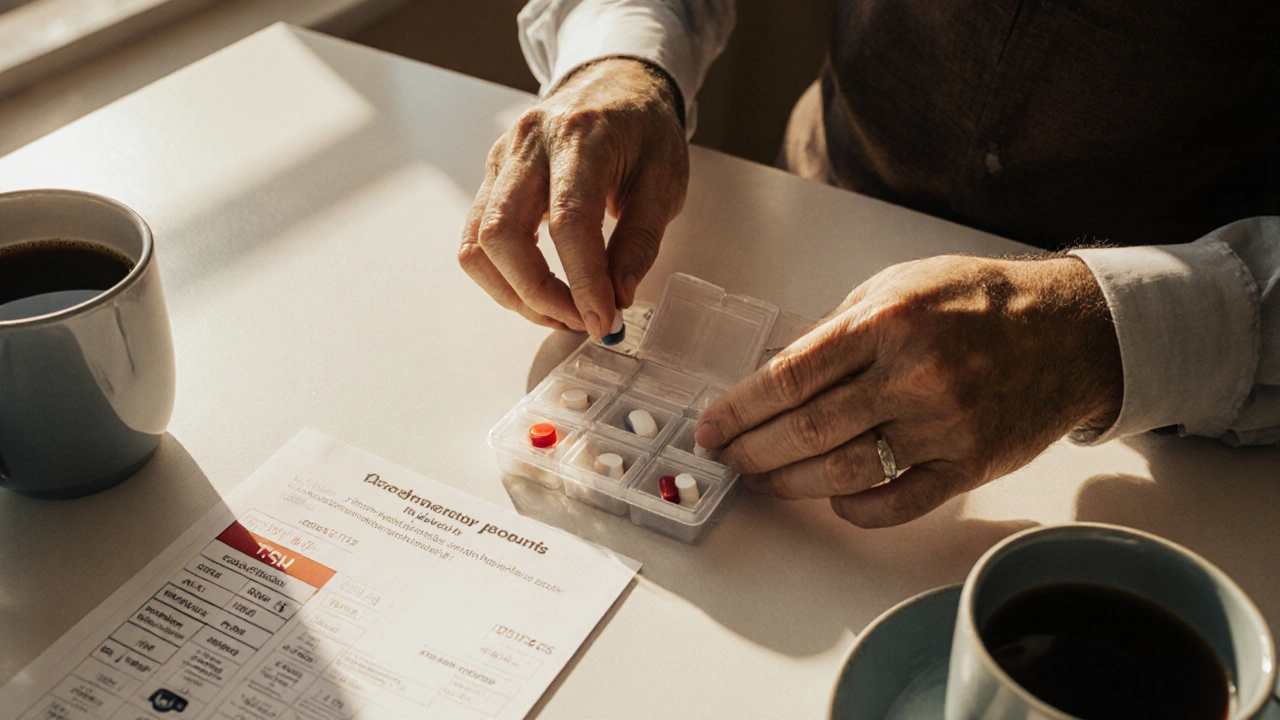If you’ve been prescribed carbimazole, you’re not alone. Thousands of people in the UK take it every year to bring an overactive thyroid back into balance. But getting the dose right isn’t a one-size-fits-all process. Too little, and your symptoms won’t improve. Too much, and you risk side effects or even an underactive thyroid. The goal isn’t just to take the pill - it’s to find the sweet spot that keeps your thyroid working without overcorrecting.
What Carbimazole Does for Your Thyroid
Carbimazole is an antithyroid drug that stops your thyroid gland from making too much hormone. In hyperthyroidism - often caused by Graves’ disease - your thyroid goes into overdrive, pumping out excess T3 and T4. This can lead to rapid heartbeat, weight loss, shaky hands, anxiety, and trouble sleeping. Carbimazole works by blocking the enzyme that turns iodine into thyroid hormone. It doesn’t destroy the gland. It just slows it down.
Unlike radioactive iodine or surgery, carbimazole is reversible. That’s why it’s often the first choice for people under 50, pregnant women, or those who want to avoid permanent changes. But it’s not a quick fix. It takes weeks for hormone levels to drop. Most people start feeling better after 2 to 4 weeks, but blood tests are what really tell the story.
Typical Starting Doses: What Doctors Usually Prescribe
In the UK, the usual starting dose for adults with moderate hyperthyroidism is 10 to 30 mg per day. That’s usually split into two doses - say, 10 mg in the morning and 10 mg at night. For more severe cases, doctors might start at 40 mg daily, but that’s less common.
Here’s what you’re likely to see based on your condition:
- Mild hyperthyroidism: 5-15 mg per day
- Moderate: 15-30 mg per day
- Severe: 30-40 mg per day (rarely used long-term)
Children and teenagers usually start lower - around 0.3 mg per kg of body weight - and are monitored closely. Pregnant women often get the lowest effective dose, especially in the first trimester, because carbimazole can cross the placenta. In the second and third trimesters, many switch to propylthiouracil (PTU) for extra safety, though carbimazole is still used if PTU isn’t tolerated.
How Your Dose Gets Adjusted Over Time
After you start carbimazole, your doctor won’t just leave you on the same dose forever. Blood tests - specifically TSH, free T4, and free T3 - are checked every 4 to 8 weeks. The goal is to get your hormone levels into the normal range without going too far.
Once your levels start to drop, your dose is usually reduced. This is called the titration phase. For example:
- Start at 20 mg/day
- After 6 weeks, TSH normalizes, T4 is dropping - reduce to 10 mg/day
- After another 6 weeks, levels are stable - reduce to 5 mg/day
- Eventually, some people stay on 2.5-5 mg/day long-term
Some patients are switched to a block and replace approach. Here, a higher dose of carbimazole (like 20-30 mg) shuts down thyroid hormone production completely. Then, you take levothyroxine (synthetic T4) to replace what your body can’t make. This method gives tighter control and is often used if your thyroid is very enlarged or if you’ve had bad side effects with lower doses.
When Lower Doses Are the Goal
Many people worry that if they’re on carbimazole for months or years, they’re “addicted” to it. That’s not true. The goal for most is to eventually stop it - especially if you’re young and your Graves’ disease is mild. About 30-50% of people go into remission after 12 to 18 months of treatment. The key is getting your dose low enough to avoid side effects while keeping your thyroid quiet.
Studies from the NHS show that people who stay on 5 mg or less for 6-12 months after their hormone levels normalise have the best chance of staying in remission. Going too low too fast - like dropping from 20 mg to 2.5 mg in one step - can cause your thyroid to flare up again. That’s why gradual reductions, guided by blood tests, matter.

Signs Your Dose Might Be Too High
Carbimazole is generally safe, but side effects can happen. Most are mild - a rash, joint pain, or upset stomach. But some are serious and need immediate attention.
If you start feeling:
- Fever or sore throat that won’t go away
- Unexplained bruising or bleeding
- Yellowing of skin or eyes
- Severe fatigue or dizziness
- stop taking carbimazole and get a blood test right away. These could be signs of agranulocytosis (a dangerous drop in white blood cells) or liver damage. These are rare - less than 1 in 1,000 people - but they happen fast. The risk is highest in the first 3 months, so your doctor will likely ask you to get a blood test then.
Another sign your dose is too high? Feeling tired, cold, or gaining weight. That means your thyroid is now underactive - a condition called hypothyroidism. It’s not a failure. It’s just your body responding to too much medication. Your doctor will lower your dose or add levothyroxine to balance it out.
What Happens If You Miss a Dose?
Carbimazole has a half-life of about 4-6 hours, but its effects last much longer because it builds up in your thyroid tissue. So if you miss one dose, don’t panic. Take it as soon as you remember - unless it’s close to your next dose. Then skip it. Don’t double up.
Missing a few doses won’t cause a sudden hormone spike. But consistently skipping doses can make your symptoms come back. If you’re having trouble remembering, set a phone alarm or use a pill box. Some people find it easier to take their daily dose all at once in the morning rather than splitting it.
Long-Term Use and Remission
Many people take carbimazole for 12 to 18 months. After that, your doctor may suggest stopping it to see if your thyroid can stay normal on its own. About 1 in 3 people stay in remission. The others will need lifelong treatment - either with a low dose of carbimazole or by switching to levothyroxine after the thyroid becomes underactive.
There’s no magic formula to predict who will go into remission. But some factors help:
- Smaller thyroid gland size
- Lower antibody levels (TSH receptor antibodies)
- Younger age at diagnosis
- Lower starting dose of carbimazole
- Staying on a low maintenance dose for at least 6 months before stopping
If your antibodies are still high when you stop, your chances of relapse are higher. That’s why doctors often retest them before coming off the drug.

What to Do If Carbimazole Doesn’t Work
If your symptoms don’t improve after 8-12 weeks, or if your hormone levels stay high despite increasing the dose, your doctor might consider other options:
- Switch to propylthiouracil (PTU) - used more often in pregnancy or if you can’t tolerate carbimazole
- Radioactive iodine therapy - permanently reduces thyroid activity
- Thyroid surgery - removes part or all of the gland
Each has pros and cons. Radioactive iodine is common in the UK and often leads to hypothyroidism - which is easy to manage with daily levothyroxine. Surgery is reserved for very large goitres or when cancer is suspected.
Key Takeaways
- Start doses range from 5-40 mg/day, depending on how overactive your thyroid is
- Regular blood tests every 4-8 weeks guide dose changes - don’t guess
- Lower doses (5-10 mg/day) are safer and help you reach remission
- Stop carbimazole and get blood work immediately if you get fever, sore throat, or bruising
- Remission is possible - but only after staying on a low dose for at least 6 months
- If carbimazole doesn’t work, alternatives like radioactive iodine or surgery are safe and effective
Frequently Asked Questions
How long does it take for carbimazole to start working?
It usually takes 2 to 4 weeks before you start feeling better. That’s because carbimazole blocks new hormone production, but your body still has to use up the excess hormones already in your bloodstream. Blood tests, not symptoms, are the best way to track progress.
Can I drink alcohol while taking carbimazole?
Yes, moderate alcohol is generally safe. But if you’re already feeling tired or your liver is under stress from the medication, alcohol can make those side effects worse. Stick to the UK’s low-risk guidelines - no more than 14 units per week - and avoid binge drinking.
Is carbimazole safe during pregnancy?
Carbimazole can be used in pregnancy, but the lowest effective dose is critical. In the first trimester, doctors often switch to propylthiouracil (PTU) because of a slightly higher risk of birth defects with carbimazole. After the first 12 weeks, carbimazole is usually preferred again because PTU carries a higher risk of liver damage. Always work closely with your endocrinologist and obstetrician.
Will I need to take carbimazole for life?
Not necessarily. About 30-50% of people go into remission after 12-18 months of treatment. If your thyroid function stays normal after stopping, you won’t need it anymore. But if your antibodies stay high or your symptoms return, you may need to restart or switch to lifelong levothyroxine.
Can carbimazole cause weight gain?
Carbimazole itself doesn’t cause weight gain. But when your thyroid slows down, your metabolism returns to normal - which means you might gain weight if you’re still eating the same amount as when you were hyperthyroid. That’s not the drug’s fault - it’s your body rebalancing. Adjusting your diet and activity levels helps.

Debra Callaghan
November 1, 2025 AT 04:15Carbimazole isn’t a magic pill - it’s a balancing act. I was on 30mg for months, then my doctor dropped me to 5mg. I felt like a zombie at first, then I felt like myself again. Don’t rush the taper. Your body isn’t broken - it’s just recalibrating.
Mitch Baumann
November 1, 2025 AT 04:35Let’s be honest - most people have no idea what TSH, FT4, or FT3 even stand for. I mean, really? You’re trusting your endocrine system to someone who can’t even spell ‘thyroid’ without autocorrect saving them? 🤦♂️
Samuel Wood
November 2, 2025 AT 16:45carbimazole is fine i guess but why do docs always go for the 'block and replace' thing? its like putting a bandaid on a broken leg. i had a friend who switched to PTU and it was like night and day. also, why is no one talking about the gut microbiome connection? its all about the gut, bro.
ridar aeen
November 3, 2025 AT 01:46I’ve been on 2.5mg for 3 years now. I don’t feel like I’m ‘on medication’ - I feel like I’m finally living. People say ‘you’re lucky you found remission’ - but I didn’t find it. I waited. I tracked. I listened. And I didn’t panic when my TSH crept up. Patience isn’t passive - it’s power.
chantall meyer
November 3, 2025 AT 14:11Why do people think this is complicated? You take the pill. You get bloods. You adjust. Done. Stop overthinking. Your thyroid isn’t a Netflix algorithm. It’s biology. Simple.
Lorne Wellington
November 4, 2025 AT 03:04Hey everyone - I’m a thyroid nurse in Vancouver, and I’ve seen over 500 people navigate this. The #1 mistake? Stopping meds because they ‘feel fine.’ You don’t feel fine because your thyroid is quiet - not because you’re cured. Keep those blood tests. Keep the low dose. And if you’re pregnant? Please, please, please talk to your endo before you skip a pill. 💙
Will RD
November 4, 2025 AT 06:14if you're on carbimazole and you get a sore throat just stop it. no excuses. no waiting. go to er. i did. almost died. dont be dumb.
Jacqueline Anwar
November 4, 2025 AT 23:24It is deeply concerning how casually this condition is managed in primary care. The notion that a 5mg dose is ‘maintenance’ without regular antibody testing is medically negligent. Many patients are left in a liminal state - neither hyper nor euthyroid - because their physicians lack the expertise to interpret the nuances of TSH receptor antibody titers. This is not a pharmacy script. It is a chronic autoimmune disorder requiring specialized oversight.
Ganesh Kamble
November 6, 2025 AT 10:28lol why are we all pretending this isn't just a money machine? thyroid meds are billion dollar industry. everyone wants you on lifelong pills. my cousin went off carbimazole after 6 months, ate more kale, did yoga, and now she's 'fine'. no blood tests needed. who needs science when you got vibes?